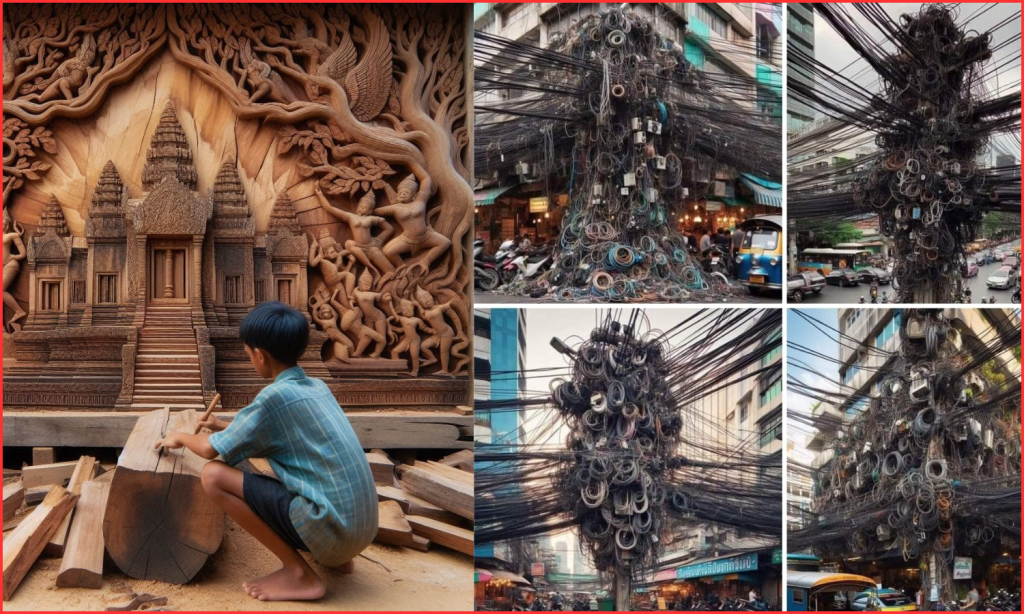While the freedom to create and access media content has expanded in recent years, the rise of fake and inaccurate information has also become a significant issue. This growing problem is a major concern for social media users, as well as for society and the nation at large. The unchecked spread of misinformation can lead to confusion, distrust, and division within communities, making it more difficult to distinguish between credible sources and false narratives.
As a result, there is an urgent need for media literacy and fact-checking efforts to mitigate the harmful impact of misinformation in today’s digital age.
The Top 4 Fact-Finding Events for 2024
As of the publication of this article, Fact Crescendo Cambodia’s team has verified and fact-checked over 230 articles in 2024, including images, videos, news, and claims:
1. Cambodian Political Situation
Former Cambodian Prime Minister Hun Sen and current Prime Minister Hun Manet have long been the targets of rumors and accusations throughout their political careers. These claims have been spread via photoshopped images, manipulated video clips, and false statements.
Such misinformation has gained widespread attention on social media platforms, with numerous Facebook users questioning the validity of these claims. Many individuals have shared these posts without verifying their accuracy, amplifying the spread of false information.
However, after thorough investigation, Fact Crescendo Cambodia’s team reviewed the allegations and found that the claims were baseless and untrue. This highlights the critical importance of fact-checking and responsible media consumption in an age where misinformation can quickly gain traction online.
Please read the details about our fact-finding via the link below:
- A False Claim Says Hun Sen Gets Hemodialysis in Japan (archived link)
- Photo showing Hun Sen and his wife saluting the former Vietnamese leader altered (archived link)
- RFA Journalists Clarify Chanboth in Speedy Recovery from the Operation (archived link)
- False Claim Says Cambodian Police Chief Shot by Unknown Gunman (archived link)
- A Photo of Hun Sen’s Wife in a Funeral Flower Stand Altered (archived link)
2. Online Scams on Cambodian Social Media
As technology continues to advance and evolve at a rapid pace, it also opens the door to various forms of fraud that affect users. In the past, the Department of Anti-Technology Crime has reported numerous cases of online fraud, highlighting the growing risks associated with digital platforms.
Recently, the department has issued a warning about a specific form of fraud involving phishing links sent through messages. This scam is designed to trick users into providing sensitive personal information, such as passwords or bank details, by pretending to be legitimate organizations or services.
To protect themselves, all technology users are urged to exercise heightened caution when receiving unsolicited messages or links, especially those requesting personal information. As fraud tactics become more sophisticated, it is crucial for individuals to stay informed and vigilant in order to safeguard their digital security.
Ways to protect yourself from online scams:
- Don’t share your passwords with anyone,
- Keep your personal information safe,
- Don’t click on suspicious links.
Please read the details about our fact-finding via the link below:
- Fake Samsung Discounts Used in Online Phishing Scams (archived link)
- A Scam of French Donation Spreading on Telegram (archived link)
- Phishing Scams Claim Apple Offers Free Many Scratched iPhones (archived link)
- Fake Makro Shopping Mall Announcements Deceive Social Media Users (archived link)
- A message asking users to verify their bank account is a scam (archived link)
3. Imagery produced by artificial intelligence (AI) technology
Fact Crescendo Cambodia has verified several images and video clips that were generated by AI software but were later shared by some social media users as authentic. These AI-generated media often appear highly realistic, making it difficult for many users to distinguish them from actual content.
This misuse of artificial intelligence to create misleading or entirely fabricated visuals poses a growing challenge in the fight against misinformation. It highlights the increasing need for digital literacy and critical thinking, as well as the importance of relying on credible sources for information. Fact Crescendo Cambodia continues to play a vital role in identifying and debunking such misleading content, helping to protect users from being deceived by artificially created media.

Please read the details about our fact-finding via the link below:
- AI Images Falsely Portrayed as ‘Youngest Pregnant Child’ in the Philippines (archived link)
- AI-Generated Images of Mike Tyson Going Viral on Social Media (archived link)
- Photo showing wire cables tangling in Bangkok generated by AI (archived link)
- AI-Generated Image Feature a Whale Next to a Large Full Moon (archived link)
- AI-generated video showing performers transformed into actual animals (archived link)
4. Attaching photos and video clips related to natural disasters
In 2024, numerous photos and video clips depicting homes, buildings submerged and damaged by floods and other natural disasters in countries such as Japan, Vietnam, and the United Arab Emirates were widely shared on social media. These images were often accompanied by false claims and misleading captions, leading many users to believe that they reflected recent events in those countries.
However, upon closer examination, it became clear that many of these images were either outdated, taken from unrelated incidents, or entirely fabricated. This widespread circulation of misleading content not only created confusion but also amplified panic and fear among the public.
Such incidents highlight the increasing challenge of verifying the authenticity of visual content in the digital age. It underscores the importance of fact-checking and responsible social media use to prevent the spread of misinformation, particularly when it comes to sensitive topics like natural disasters. Fact Crescendo Cambodia, along with other fact-checking organizations, continues to work diligently to expose such false claims and provide the public with accurate, reliable information.
Please read the details about our fact-finding via the link below:
- An Old Video of Fishes Reeling a Supermarket Falsely Linked to Dubai’s Flood (archived link)
- Old Video of Tsunami 2011 Falsely Linked to Japan’s Recent Earthquake (archived link)
- An Old Video of Tsunami in Japan in 2011 Falsely Claimed as Flood in Dubai (archived link)
- An Old Flood Footage Misidentified As a Recent Flood in Korea (archived link)
The spread of fake news has had a deeply negative impact on society and the nation. Fact Crescendo Cambodia has found that it can cause chaos in communities, leading to discrimination, ethnic hostility, loss of trust in public institutions, theft of personal data, and threats to public safety.
How can Cambodian social media users prevent the spread of fake news?
As fake news continues to spread on social media, Khmer-speaking users must exercise caution before believing or sharing any information. When encountering suspicious content, they should avoid reacting impulsively or forwarding it right away. Instead, they should take the necessary time to carefully verify the source and assess the credibility of the information.
It is essential to recognize that much of the false information circulating online is deliberately created to serve economic, political, or ideological agendas. These misleading narratives can have far-reaching consequences, including manipulating public opinion, causing social unrest, or damaging reputations.
By practicing critical thinking and verifying the accuracy of content before sharing it, users can play a vital role in curbing the spread of misinformation. This not only protects their own digital well-being but also contributes to the overall integrity and trustworthiness of online spaces. Fact-checking tools and reliable news sources can help users identify misleading content and ensure that only truthful, well-sourced information is shared within their networks.
Follow Us and Stay Up to Date with Our Latest Fact Checks.
Facebook | Twitter | Telegram | Google News | TikTok | WhatsApp

Title:A recap of important fact-finding events for 2024 in Cambodia
Written By: Kakada SimResult: Insight





